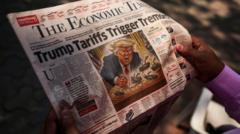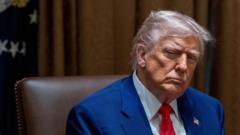The upheaval in the bond market reflects growing anxiety over economic stability linked to trade policies.
**Trump's Tariff Policies Shake U.S. Bond Market**

**Trump's Tariff Policies Shake U.S. Bond Market**
As tariffs escalate, U.S. Treasury yields see significant fluctuations, raising investor concerns.
The U.S. bond market, traditionally viewed as a cornerstone of financial security, has recently experienced considerable turbulence. Specifically, the yield on the 10-year Treasury bond surged to approximately 4.5 percent, rising from less than 4 percent at the beginning of the week. This noteworthy increase signals a loss of confidence among investors towards U.S. assets amid the intensifying trade conflict sparked by the Trump administration's tariff strategies.
Treasuries, known for being a haven during economic instability, have witnessed unpredictable behavior over the past week, prompting fears that the ongoing trade war under President Trump could foster significant volatility. While an increase of about 0.1 percentage points in yield may seem insignificant at first glance, in the context of Treasuries, such fluctuations are substantial. This increase directly impacts corporate borrowing and consumer loans, potentially raising costs for mortgages and car loans that are benchmarked against the 10-year yield.
The rise in Treasury yields also emphasizes the complicated relationship between governmental financial policy and market confidence. As the trade war escalates, investors are increasingly cautious, questioning the long-standing reliability of U.S. government bonds. This sentiment reflects concerns over the broader implications of Trump's tariff policies on both domestic and global financial markets, with many now bracing for further shifts.
Treasuries, known for being a haven during economic instability, have witnessed unpredictable behavior over the past week, prompting fears that the ongoing trade war under President Trump could foster significant volatility. While an increase of about 0.1 percentage points in yield may seem insignificant at first glance, in the context of Treasuries, such fluctuations are substantial. This increase directly impacts corporate borrowing and consumer loans, potentially raising costs for mortgages and car loans that are benchmarked against the 10-year yield.
The rise in Treasury yields also emphasizes the complicated relationship between governmental financial policy and market confidence. As the trade war escalates, investors are increasingly cautious, questioning the long-standing reliability of U.S. government bonds. This sentiment reflects concerns over the broader implications of Trump's tariff policies on both domestic and global financial markets, with many now bracing for further shifts.






















